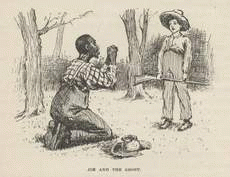Well, here's a piece I never imagined myself writing: A defense of a white man's use of the N-word.
I want to start with a little back-story: I don't use the N-word. Not ever. But I used to, not so long ago. I used it in the context of talking about racism in my psychology of race and ethnicity course and only when quoting the written words of scholars and prominent historical figures. I stopped (about 5 years ago) after several students told me that hearing the word, even in this context, was painful for them. I stopped because it was clear to me that the students were sincere and because I thought I could teach the content just as well by saying "N-word".
I haven't questioned this choice since then, but ever since the Huck Finn story broke, I've been doing just that. See, all of the students who complained that hearing "n-word" in class was painful were white and so it seems is the vast proportion of people who a) kept Huckleberry Finn off the school curriculum and b) like the idea of a "cleaner" version of Mark Twain's novel.
Now I don't want to over-stress this point. The feelings and needs of white people matter too. It's why I switched to using "N-word" in my class. But the source of the discomfort is not irrelevant either. For one, it suggests whose needs are being considered and served by the given act. As far as I can tell, the new (edited) edition of Huck Finn is primarily designed to serve the needs of white conservatives. This too is okay, as long as we acknowledge that this is what's happening and not pretend that this is some kind of racially progressive act that will improve the lives of people of color.

It's more complicated than that, of course. In a recent opinion piece in the New York Times, law professor Paul Butler (who is Black) wrote
"I suffered through Huckleberry Finn in high school, with the white kids going out of their way to say "n-word Jim" and the teacher's tortured explanation that Twain's "n-word" didn't really mean n-word, or meant it ironically, or historically, or symbolically. Whatever."
No doubt Butler's experiences were not unusual for either his time or today, and I wouldn't wish them on anyone. Student racial insensitivity and teacher discomfort with both our country's racist past and contemporary racial inequity are serious problems requiring thoughtful strategies. I just happen to think that the strategy of removing racially objectionable content cannot possibly be effective in anything other than eliminating discomfort, and I am becoming increasingly convinced that, from an educational standpoint, the elimination of discomfort is counterproductive.
Discomfort is feedback. Sometimes it is an indication that our beliefs and values are being challenged. Other times (as in Butler's recollection of his school experience), it is an internal message that something isn't working well. Either way, I wish the discomfort would be engaged, rather than avoided. For teachers and school administrators who are too embarrassed, uncomfortable, and quite possibly uninformed to teach about our country's racist past, it means creating or finding a way to further their own learning and growth. For students, it means not only understanding the story's plot but the complex racial dynamics of Twain's Mississippi and their own school and community. Part of that understanding is some sense of how the N-word was used historically and it's impact on Black people both then and now.

Proponents of the new edition will point out that other editions are readily available, and of course they are. But to me, this isn't about personal choice, which I hold very dear, but about the inevitable imposition of power in the educational system. The books used by schools are selected by school boards and administrators, not students and parents. To be sure, the school boards and administrators likely to choose this edition are probably those which previously left Huckleberry Finn off the curriculum altogether. Frankly, the trade-off isn't worth it to me. I'd rather the schools avoid the book entirely than treat it and the history it represents dishonestly. Unlearning is always much, much harder than new learning.
Oh, and by the way: I wouldn't feel this way if we were discussing a racist novel. Twain was a progressive whose racial politics were decades ahead of his time. He used the word to "ridicule" the racism of his day, not endorse it or legitimize it. The problem with the original Huck Finn isn't the N-word but with our own aversive racism. If we are to heal as a nation, this too we must engage rather than avoid.
Which brings me back to my own classroom: Next time I teach my race class (Fall, 2011), we're going to have a conversation about the N-word as a group. I'll let the class make the decision, but only after we engage with and consider the multiple perspectives. I look forward to discovering how that goes.





